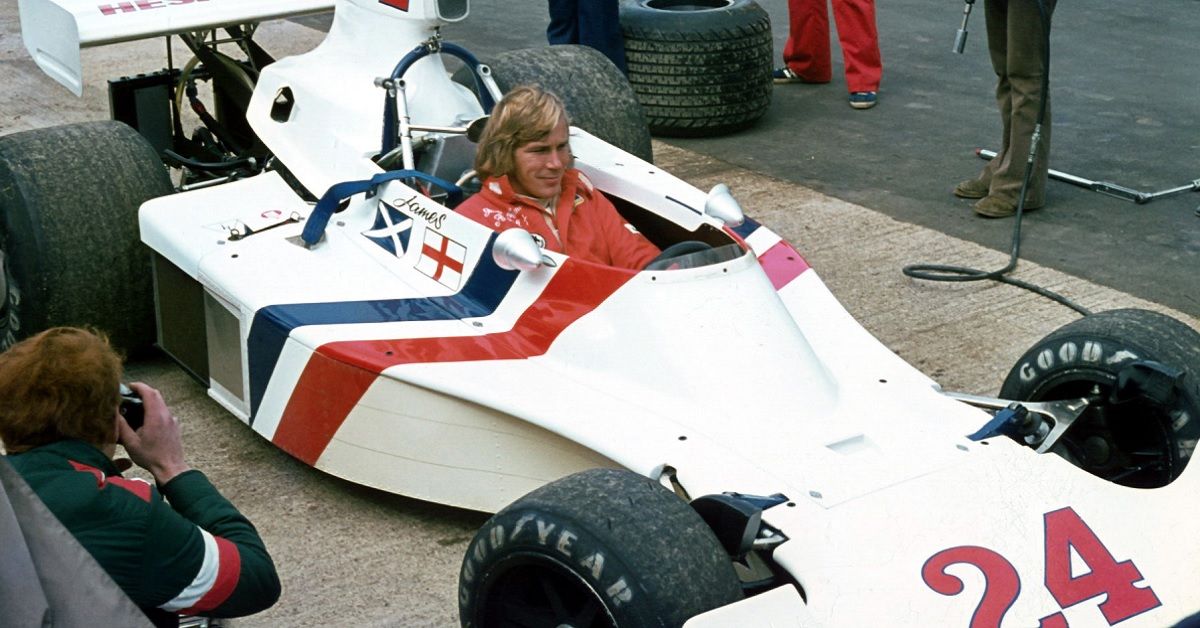In 2013 the New York Post published an article titled "‘Rush’ only hints at race-car driver James Hunt’s exploits". The article chronicles James Hunt's exploits both in life, and in death which gave him the title of the last playboy racer. Journalist Reed Tucker describes the British driver as "handsome, with blond hair and a chiseled face, rich and world-famous. But he also had a bit of Steven Tyler in him, indulging in copious amounts of booze, drugs and women."
This personality was represented well in the film Rush where his jacket emblazoned with the slogan, "Sex, the breakfast of champions" is a major plot point and the same wordplay which landed him with the nickname, "Hunt The Shunt" is used from the off with his rivalry with Niki Lauda. These memorable moments are indeed why Hunt is a Formula 1 legend but it wasn't all like this, his first Formula 1 team Hesketh struggled dearly before he found his way into the championship-contending McLaren car.
Hunt is an icon of excess and hedonism in a sport that likes to be seen as professional.
A Hot-Headed Driver
Hunt had a rather brief Formula 1 career, being crowned world champion in 1976 after 9 victories in the 16 round championship which was fought primarily between himself and Lauda. He entered the Formula 1 world championship in 1973 and left in 1979 having spent his final season with Wolf Racing after having difficulties with Mclaren.
The 1977 season was plagued with difficulties, at the 1977 Canadian Grand Prix Hunt earned the title, Hunt The Punch in a moment which can be found on the Road and Track website. After stopping and exiting his car he punched a marshal. This season also saw Hunt fined for not attending the podium ceremony.
Racefans.net labelled this moment as "Hunt does a runner", with tragedy having struck the track on that day only one driver stuck around for the ceremony. 1978 wasn't much better as the Lotus 79 was introduced, penned by Colin Chapman and his best team the car-dominated with Mario Andretti making full use of the car's ground effects and took the world championship leaving the rest of the field in its wake. The James Hunt website which is operated by the driver's sun claims that in 1979 after retirement from the Monaco Grand Prix, the driver decided to retire after a 92 race long career.
Funded On A Shoestring
The New York Post reported that Hunt's first Formula car used a lawn chair as a seat, he was disqualified for being an unsafe racer. His early operations being run by a shoestring was pretty common. Hesketh Racing despite no longer racing has a website in which they claim they were truly the last privateers in Formula 1, with no sponsors the team was bankrolled by Lord Hesketh.
The team claim they aimed to challenge the establishment, race in style, and in turn, be excessive in a time when Britain was in the grasp of an economic downturn and political turmoil. The team's first success came at Zandavoort in 1975, they quote Hunt as saying "For once I didn't make any mistakes", it was the team's only success as they withdrew from racing with Lord Hesketh entering politics and Hunt moving to the better-funded Mclaren for the 1976 season.
However, the team's website doesn't cite what is largely seen as the team's real reason for withdrawing from Formula 1. In a heartbreaking scene in the film Rush, Lord Hesketh announces that he made a "miscalculation" and without sponsors, the team would be doomed.
After Retirement
One world championship under his belt and a rivalry with one of Formula 1's greatest drivers isn't the reason why he is a Formula 1 legend. In the modern Formula 1 paddock Hunt's actions and reputation would see him dismissed instantly as an alcoholic and womanizer with a lack of professionalism. The New York Post collected the tales of his antics which include everything from vomiting on team sponsors to propositioning journalists.
However with a British charm and a tabloid drama involving himself, his wife and star Richard Burton the charming man captured the hearts of both Formula 1 fans and the public in a way that no driver with excessive press training has since managed to do. Hunt was an aggressive driver thus his name was "Hunt The Shunt", however, the peak of his career as memorialised in Rush was at the 1976 Suzuka Grand Prix where the driver won the championship by one point over Niki Lauda who had the horrific crash at the Nordschleife earlier in the season.
When Hunt left Formula 1 he continued to be around the sport taking a position as a commentator on the BBC. The New York Post claim that whilst commentating on that first race the driver drank two bottles of wine, in keeping the man's character. Eventually, Hunt passed away in 1993 from a heart attack, a few obituaries have been digitised. The Independent's obituary recounts his Formula 1 career and goes into detail about some of his racing victories before sensitively describing his vices.
The article closes by describing the man's more mature retirement, driving an Austin Van he was near penniless but gave back to the sport in any way he could. As an icon of opulence and excess in one of the planet's most excessive sports, a world champion and someone who gave back to the sport in his later year's Hunt cemented his position as a legend of Formula 1.



.jpg)
.jpg)